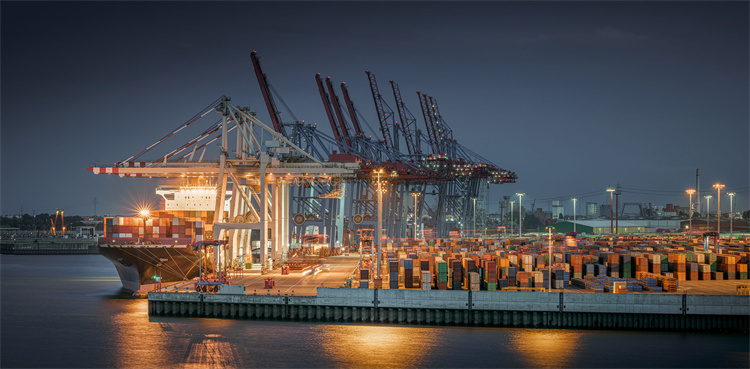Optimizing Supply Chains: The Role of Transportation Services, Freight Forwarding, and Technology Integration

Transportation services form the backbone of the global economy, driving growth and connectivity. You rely on various modes—air, sea, rail, and road—to move goods efficiently. Each mode plays a crucial role in ensuring timely delivery and cost-effectiveness. Companies like JUSDA excel in this domain, seamlessly transporting goods between suppliers, manufacturers, and customers. Their expertise spans across all transportation modes, ensuring reliability and efficiency. Freight forwarding companies also play a pivotal role by organizing shipments and coordinating logistics, making them indispensable in the supply chain.
Understanding Transportation Services
Definition and Scope
What are Transportation Services?
Transportation services encompass the movement of goods and people from one location to another. You rely on these services to ensure that products reach their destinations safely and efficiently. They form the backbone of global trade, enabling businesses to connect with markets worldwide. By utilizing various transportation modes, you can optimize delivery times and costs, ensuring that your supply chain operates smoothly.
Key Components of Transportation Services
Transportation services consist of several key components that work together to facilitate the movement of goods. These include:
Logistics Management: Ensures that goods are transported in the most efficient manner.
Freight Forwarding: Organizes shipments and coordinates logistics, making it a crucial part of the supply chain.
Warehousing: Provides storage solutions to manage inventory effectively.
Distribution: Ensures that goods are delivered to their final destinations.
Companies like JUSDA excel in managing these components, offering comprehensive solutions that enhance supply chain efficiency.
Modes of Transportation
Air Transportation
Air transportation offers the fastest transit times, making it ideal for urgent shipments. Although it is the most expensive mode, you benefit from its speed and reliability. Air transport is crucial for high-value or time-sensitive goods, ensuring they reach their destinations quickly.
Sea Transportation
Sea transportation provides a cost-effective solution for moving large volumes of goods over long distances. While it has longer transit times compared to air, it is more economical for bulk shipments. You can leverage sea transport for international trade, benefiting from its capacity to handle large cargo loads.
Rail Transportation
Rail transportation strikes a balance between speed and cost. It is cheaper than air transport and faster than ocean transport, making it a viable option for many businesses. Rail is also more environmentally friendly than air, offering a sustainable alternative for moving goods over land.
Road Transportation
Road transportation is versatile and accessible, suitable for both short and long distances. You can use road transport to connect different modes, facilitating seamless transitions in the supply chain. Its flexibility makes it an essential component of logistics, ensuring that goods reach their final destinations efficiently.
By understanding these modes and their unique advantages, you can make informed decisions about the best transportation solutions for your needs. Companies like JUSDA, with their expertise in air, sea, rail, and road transport, provide reliable and efficient services that enhance your supply chain operations.
The Role of Freight Forwarding Companies

Importance in the Supply Chain
Freight forwarding companies play a pivotal role in the supply chain. You rely on them to organize shipments efficiently. They ensure that goods move seamlessly from one point to another. By coordinating logistics, they help you meet delivery deadlines and maintain customer satisfaction.
Organizing Shipments
Freight forwarders excel at organizing shipments. They handle the complex logistics involved in transporting goods. You benefit from their ability to manage documentation, customs clearance, and cargo insurance. This expertise ensures that your shipments reach their destinations without unnecessary delays.
Coordination between Different Modes
Freight forwarders coordinate between different transportation modes. They integrate air, sea, rail, and road transport to optimize delivery routes. This coordination allows you to choose the most efficient and cost-effective options for your shipments. Companies like JUSDA specialize in this integration, providing reliable services that enhance your supply chain operations.
Benefits of Using Freight Forwarders
Freight forwarders offer several benefits that enhance your logistics operations. Their services provide you with cost efficiency and expert guidance.
Cost Efficiency
Using freight forwarders can lead to significant cost savings. They negotiate better rates with carriers due to their volume of shipments. You gain access to these competitive rates, reducing your overall transportation costs. Additionally, their expertise in logistics helps you avoid costly mistakes and delays.
Expertise and Experience
Freight forwarders bring valuable expertise and experience to your supply chain. They understand the intricacies of international shipping regulations and customs procedures. You benefit from their knowledge, ensuring compliance and smooth transit of goods. Their experience allows them to anticipate potential issues and provide proactive solutions, keeping your shipments on track.
By leveraging the services of freight forwarding companies, you can optimize your supply chain and achieve greater efficiency. Their role in organizing shipments and coordinating transportation modes is indispensable. With their support, you can focus on growing your business while they handle the logistics.
Benefits of Managed Transportation Solutions
Efficiency and Cost Savings
Streamlining Operations
You can transform your logistics operations by embracing managed transportation solutions. These services streamline your processes, ensuring that every shipment moves smoothly from origin to destination. By optimizing routes and schedules, you reduce delays and improve delivery times. This efficiency not only enhances your operational flow but also boosts your overall productivity. Companies like JUSDA excel in this area, offering seamless integration across air, sea, rail, and road transport. Their expertise ensures that your goods reach their destinations efficiently, enhancing your supply chain's reliability.
Reducing Transportation Costs
Managed transportation solutions offer significant cost savings. By leveraging economies of scale, you access better rates and reduce your transportation expenses. Freight forwarding companies play a crucial role here, negotiating competitive rates with carriers on your behalf. Their expertise helps you avoid costly mistakes and unnecessary fees. As a result, you can allocate resources more effectively, investing in other areas of your business. The growth of the Managed Transportation Services market reflects this value, with projections indicating continued expansion. This trend underscores the importance of adopting these solutions to stay competitive.
Strategic Importance
Enhancing Supply Chain Visibility
Visibility is key to a successful supply chain. Managed transportation solutions provide you with real-time insights into your shipments. You gain access to tracking systems that monitor your goods at every stage. This transparency allows you to anticipate potential disruptions and make informed decisions. By enhancing supply chain visibility, you improve your ability to respond to changes and maintain control over your logistics operations. JUSDA's JusLink intelligent supply chain exemplifies this approach, integrating IoT and big data to offer unparalleled visibility and collaboration.
Improving Customer Satisfaction
Customer satisfaction hinges on timely and reliable deliveries. Managed transportation solutions help you meet these expectations by ensuring that your shipments arrive as promised. By optimizing your logistics processes, you enhance your service levels and build trust with your customers. This reliability fosters long-term relationships and encourages repeat business. As you improve your logistics operations, you also boost your brand reputation, positioning yourself as a leader in your industry. Embracing these solutions not only benefits your bottom line but also elevates your customer experience, driving success and growth.
Integration with Technology

In today's fast-paced world, technology revolutionizes how you approach transportation. It enhances efficiency, reliability, and sustainability in moving goods and people. By embracing technological advancements, you can transform your logistics operations and stay ahead in the competitive market.
Role of Technology in Transportation
Use of GPS and Tracking Systems
GPS and tracking systems have become indispensable tools in transportation. They provide real-time data on the location and status of shipments. You gain the ability to monitor your goods throughout their journey, ensuring timely deliveries and minimizing disruptions. This transparency fosters trust with your customers, as they can track their orders and anticipate arrival times. Companies like JUSDA utilize these systems to offer seamless transportation services across air, sea, rail, and road, ensuring that goods move efficiently between suppliers, manufacturers, and customers.
Automation and AI in Logistics
Automation and AI are transforming logistics by streamlining operations and reducing human error. You can automate routine tasks, such as scheduling and inventory management, freeing up resources for more strategic activities. AI algorithms analyze vast amounts of data to optimize routes and predict potential delays. This proactive approach enhances your decision-making and boosts overall efficiency. Freight forwarding companies leverage AI to organize shipments more effectively, ensuring that goods reach their destinations without unnecessary delays.
Future Trends
Digital Transformation
Digital transformation is reshaping the transportation industry. By integrating digital technologies like IoT devices and real-time tracking, you can enhance supply chain visibility and collaboration. These innovations enable you to respond swiftly to changes in demand and market conditions. As you embrace digital transformation, you position yourself as a leader in the industry, ready to adapt to evolving customer needs and expectations.
Sustainable Transportation Solutions
Sustainability is a growing concern in transportation. You can adopt eco-friendly practices to reduce your carbon footprint and contribute to a greener future. Sustainable transportation solutions include using energy-efficient vehicles, optimizing routes to minimize fuel consumption, and integrating renewable energy sources. By prioritizing sustainability, you not only meet regulatory requirements but also appeal to environmentally conscious consumers. The convergence of AI and shared mobility further supports sustainable practices, enhancing safety and efficiency in transportation.
By integrating technology into your transportation operations, you unlock new opportunities for growth and innovation. Embracing these advancements allows you to enhance efficiency, improve customer satisfaction, and contribute to a sustainable future. Companies like JUSDA lead the way in leveraging technology to provide reliable and efficient transportation services, ensuring that your goods reach their destinations seamlessly.
Selecting the Right Transportation Provider
Choosing the right transportation provider is crucial for your business success. The right partner ensures that your goods move efficiently and reliably, enhancing your supply chain operations. To make an informed decision, you need to consider several key factors and follow practical steps.
Key Considerations
Evaluating Provider Capabilities
When selecting a transportation provider, you must evaluate their capabilities thoroughly. Look for providers with a proven track record in handling shipments similar to yours. Assess their expertise in different transportation modes—air, sea, rail, and road. Companies like JUSDA excel in transporting goods between suppliers, manufacturers, and customers across these modes, ensuring reliability and efficiency.
Consider the provider's ability to manage logistics effectively. They should offer comprehensive services, including freight forwarding, warehousing, and distribution. Freight forwarding companies play a key role in organizing shipments, coordinating logistics, and ensuring timely deliveries. Their expertise can significantly enhance your supply chain operations.
Assessing Cost and Value
Cost is a critical factor when choosing a transportation provider. However, you should not focus solely on price. Instead, assess the overall value they offer. A provider that offers competitive rates while maintaining high service quality is ideal. Look for providers who can negotiate better rates with carriers due to their shipment volumes. This cost efficiency can lead to significant savings for your business.
Evaluate the provider's ability to deliver value beyond cost savings. Consider their customer service, reliability, and ability to meet your specific needs. A provider that aligns with your business goals and values can become a valuable partner in your growth journey.
Practical Steps
Conducting Market Research
Conducting thorough market research is essential when selecting a transportation provider. Start by identifying potential providers that meet your criteria. Gather information about their services, reputation, and customer reviews. Use online resources, industry publications, and networking events to gather insights.
Compare different providers based on their capabilities, cost, and value. Create a shortlist of providers that align with your business needs. This research will help you make an informed decision and choose a provider that enhances your logistics operations.
Negotiating Contracts
Once you have identified potential providers, the next step is negotiating contracts. Clearly outline your expectations and requirements in the contract. Discuss terms related to pricing, service levels, and delivery timelines. Ensure that the contract includes provisions for handling unforeseen circumstances, such as delays or disruptions.
Negotiating favorable terms requires a strategic approach. Leverage your market research and insights to negotiate better rates and terms. Industry experts emphasize the importance of balancing cost-efficiency with timely deliveries. By securing a well-negotiated contract, you can establish a strong partnership with your transportation provider.
Selecting the right transportation provider is a strategic decision that impacts your business success. By evaluating provider capabilities, assessing cost and value, conducting market research, and negotiating contracts, you can choose a partner that enhances your supply chain operations. With the right provider, you can achieve greater efficiency, reliability, and growth in your logistics operations.

JUSDA Solutions
To provide you with professional solutions and quotations.
Choosing the right transportation services and solutions is vital for your success. You can enhance efficiency and reliability by selecting providers like JUSDA, who excel in transporting goods by air, sea, rail, and road. Embrace technology and strategic partnerships to unlock optimal results. Freight forwarding companies play a key role in organizing shipments, ensuring seamless logistics. As you look to the future, consider the ethical landscape of AI-driven transportation. Focus on creating equitable and secure systems. By doing so, you position yourself at the forefront of innovation and sustainability in transportation.
See Also
Sustainable Supply Chain Transportation: The Ultimate Guide
Affordable Transportation Management: Your Budget's Ally
Revealed: The Ultimate Global Logistics Companies Guide
Exploring Supply Chain Transport Technology: Are You Prepared?
Indigenous Intelligent Transport Solutions: Redefining Efficiency
